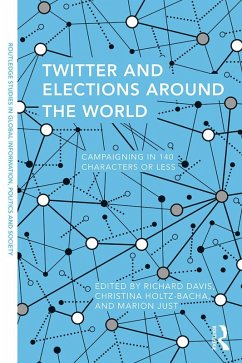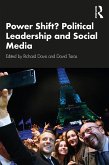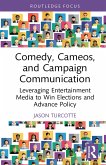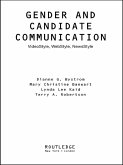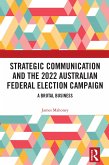Twitter and Elections Around the World (eBook, ePUB)
Campaigning in 140 Characters or Less
Redaktion: Davis, Richard; Just, Marion R.; Holtz-Bacha, Christina
45,95 €
45,95 €
inkl. MwSt.
Sofort per Download lieferbar

23 °P sammeln
45,95 €
Als Download kaufen

45,95 €
inkl. MwSt.
Sofort per Download lieferbar

23 °P sammeln
Jetzt verschenken
Alle Infos zum eBook verschenken
45,95 €
inkl. MwSt.
Sofort per Download lieferbar
Alle Infos zum eBook verschenken

23 °P sammeln
Twitter and Elections Around the World (eBook, ePUB)
Campaigning in 140 Characters or Less
Redaktion: Davis, Richard; Just, Marion R.; Holtz-Bacha, Christina
- Format: ePub
- Merkliste
- Auf die Merkliste
- Bewerten Bewerten
- Teilen
- Produkt teilen
- Produkterinnerung
- Produkterinnerung

Bitte loggen Sie sich zunächst in Ihr Kundenkonto ein oder registrieren Sie sich bei
bücher.de, um das eBook-Abo tolino select nutzen zu können.
Hier können Sie sich einloggen
Hier können Sie sich einloggen
Sie sind bereits eingeloggt. Klicken Sie auf 2. tolino select Abo, um fortzufahren.

Bitte loggen Sie sich zunächst in Ihr Kundenkonto ein oder registrieren Sie sich bei bücher.de, um das eBook-Abo tolino select nutzen zu können.
Twitter already has become an important electoral communication tool between candidates, parties and their specific constituencies. No serious candidate campaign ignores Twitter, while political party organizations utilize Twitter to communicate with partisans, reinforce supporters, and mobilize voters. Eloquently combining theory and practice, established and rising scholars in the field of political communication have been brought together to provide an essential overview of the influence of Twitter on elections in a comparative perspective.
- Geräte: eReader
- mit Kopierschutz
- eBook Hilfe
- Größe: 3.1MB
Andere Kunden interessierten sich auch für
![Power Shift? Political Leadership and Social Media (eBook, ePUB) Power Shift? Political Leadership and Social Media (eBook, ePUB)]() Power Shift? Political Leadership and Social Media (eBook, ePUB)49,95 €
Power Shift? Political Leadership and Social Media (eBook, ePUB)49,95 €![Comedy, Cameos, and Campaign Communication (eBook, ePUB) Comedy, Cameos, and Campaign Communication (eBook, ePUB)]() Jason TurcotteComedy, Cameos, and Campaign Communication (eBook, ePUB)20,95 €
Jason TurcotteComedy, Cameos, and Campaign Communication (eBook, ePUB)20,95 €![Routledge International Handbook on Electoral Debates (eBook, ePUB) Routledge International Handbook on Electoral Debates (eBook, ePUB)]() Routledge International Handbook on Electoral Debates (eBook, ePUB)45,95 €
Routledge International Handbook on Electoral Debates (eBook, ePUB)45,95 €![Winning with Words (eBook, ePUB) Winning with Words (eBook, ePUB)]() Winning with Words (eBook, ePUB)49,95 €
Winning with Words (eBook, ePUB)49,95 €![Gender and Candidate Communication (eBook, ePUB) Gender and Candidate Communication (eBook, ePUB)]() Gender and Candidate Communication (eBook, ePUB)43,95 €
Gender and Candidate Communication (eBook, ePUB)43,95 €![Strategic Communication and the 2022 Australian Federal Election Campaign (eBook, ePUB) Strategic Communication and the 2022 Australian Federal Election Campaign (eBook, ePUB)]() James MahoneyStrategic Communication and the 2022 Australian Federal Election Campaign (eBook, ePUB)41,95 €
James MahoneyStrategic Communication and the 2022 Australian Federal Election Campaign (eBook, ePUB)41,95 €![Star Power (eBook, ePUB) Star Power (eBook, ePUB)]() Lauren WrightStar Power (eBook, ePUB)27,95 €
Lauren WrightStar Power (eBook, ePUB)27,95 €-
-
-
Twitter already has become an important electoral communication tool between candidates, parties and their specific constituencies. No serious candidate campaign ignores Twitter, while political party organizations utilize Twitter to communicate with partisans, reinforce supporters, and mobilize voters. Eloquently combining theory and practice, established and rising scholars in the field of political communication have been brought together to provide an essential overview of the influence of Twitter on elections in a comparative perspective.
Dieser Download kann aus rechtlichen Gründen nur mit Rechnungsadresse in A, B, BG, CY, CZ, D, DK, EW, E, FIN, F, GR, HR, H, IRL, I, LT, L, LR, M, NL, PL, P, R, S, SLO, SK ausgeliefert werden.
Produktdetails
- Produktdetails
- Verlag: Taylor & Francis eBooks
- Seitenzahl: 248
- Erscheinungstermin: 1. September 2016
- Englisch
- ISBN-13: 9781317363132
- Artikelnr.: 45959492
- Verlag: Taylor & Francis eBooks
- Seitenzahl: 248
- Erscheinungstermin: 1. September 2016
- Englisch
- ISBN-13: 9781317363132
- Artikelnr.: 45959492
- Herstellerkennzeichnung Die Herstellerinformationen sind derzeit nicht verfügbar.
Richard Davis is Professor of Political Science and Director of the Office of Civic Engagement at Brigham Young University, USA. His research concentrates on political communication, new media, and judicial communication. Christina Holtz-Bacha is Professor of Communications at the University of Erlangen-Nürnberg, Germany. Her research and instruction focus on political communication and strategic communication as well as German and European media policy. Marion Just is the William R. Kenan, Jr. Professor of Political Science at Wellesley College, USA, and an associate of the Shorenstein Center on Media, Politics and Public Policy at Harvard's Kennedy School of Government. Professor Just's current research projects concern political campaigns, psychological aspects of voting, patterns of news, politics on the internet, and media coverage of women leaders.
Introduction
Marion Just and Christina Holtz-Bacha
Part I: Election Journalism
1. Did Twitter Kill the Boys on the Bus? A Report from the Romney Campaign
in 2012
Peter Hamby
2. Tweeting to the Press? Political Twitter Activity on Offline Media in
the 2013 German Election Campaign
Christina Holtz-Bacha and Reimar Zeh
3. U.S. Political Journalists' Use of Twitter: Lessons From 2012 and a Look
Ahead
Logan Molyneux, Rachel R. Mourao, and Mark Coddington
4. Media Coverage of an Election Campaign on Twitter: The Case of Belgium
in the EU Elections
Evelien D'heer and Pieter Verdegem
Part II: The Audience
5. Communication with Constituents in 140 Characters: How Members of
Congress Used Twitter to Get Out the Vote in 2014
Heather K. Evans
6. South Korean Citizens' Political Information Sharing on Twitter During
the 2012 General Election
Jisue Lee, Hohyon Ryu, Lorri Mon, and Sung Jae Park
Part III: Parties, Candidates, and Campaigns
7. Message Repetition in Social Media: Presidential Candidate Twitter Feeds
in the 2012 U.S. General Election
Kate Kenski and Bethany A. Conway
8. Campaigning on Twitter: The Use of Social Media in the 2014 European
Elections in Italy
Sara Bentivegna and Rita Marchetti
9. Candidate Use of Twitter and the Intersection of Gender, Party, and
Position in the Race: A Comparison of Competitive Male/Female Senate Races
in 2012 and 2014
Marion R. Just, Ann N. Crigler, and Rose A. Owen
10. Who Gets to Say #Are You Better Off? Promoted Trends and Bashtagging in
the 2012 U.S. Presidential Election
Joel Penney
11. Parties, Leaders, and Online Personalization: Twitter in Canadian
Electoral Politics
Tamara A. Small
12. Social Media Coming of Age: Developing Patterns of Congressional
Twitter Use, 2007-2014
David S. Lassen and Leticia Bode
13. From a Tweet to a Seat: Twitter, Media Visibility, and Electoral
Support
Reimar Zeh
Conclusion
Richard Davis
Marion Just and Christina Holtz-Bacha
Part I: Election Journalism
1. Did Twitter Kill the Boys on the Bus? A Report from the Romney Campaign
in 2012
Peter Hamby
2. Tweeting to the Press? Political Twitter Activity on Offline Media in
the 2013 German Election Campaign
Christina Holtz-Bacha and Reimar Zeh
3. U.S. Political Journalists' Use of Twitter: Lessons From 2012 and a Look
Ahead
Logan Molyneux, Rachel R. Mourao, and Mark Coddington
4. Media Coverage of an Election Campaign on Twitter: The Case of Belgium
in the EU Elections
Evelien D'heer and Pieter Verdegem
Part II: The Audience
5. Communication with Constituents in 140 Characters: How Members of
Congress Used Twitter to Get Out the Vote in 2014
Heather K. Evans
6. South Korean Citizens' Political Information Sharing on Twitter During
the 2012 General Election
Jisue Lee, Hohyon Ryu, Lorri Mon, and Sung Jae Park
Part III: Parties, Candidates, and Campaigns
7. Message Repetition in Social Media: Presidential Candidate Twitter Feeds
in the 2012 U.S. General Election
Kate Kenski and Bethany A. Conway
8. Campaigning on Twitter: The Use of Social Media in the 2014 European
Elections in Italy
Sara Bentivegna and Rita Marchetti
9. Candidate Use of Twitter and the Intersection of Gender, Party, and
Position in the Race: A Comparison of Competitive Male/Female Senate Races
in 2012 and 2014
Marion R. Just, Ann N. Crigler, and Rose A. Owen
10. Who Gets to Say #Are You Better Off? Promoted Trends and Bashtagging in
the 2012 U.S. Presidential Election
Joel Penney
11. Parties, Leaders, and Online Personalization: Twitter in Canadian
Electoral Politics
Tamara A. Small
12. Social Media Coming of Age: Developing Patterns of Congressional
Twitter Use, 2007-2014
David S. Lassen and Leticia Bode
13. From a Tweet to a Seat: Twitter, Media Visibility, and Electoral
Support
Reimar Zeh
Conclusion
Richard Davis
Introduction
Marion Just and Christina Holtz-Bacha
Part I: Election Journalism
1. Did Twitter Kill the Boys on the Bus? A Report from the Romney Campaign
in 2012
Peter Hamby
2. Tweeting to the Press? Political Twitter Activity on Offline Media in
the 2013 German Election Campaign
Christina Holtz-Bacha and Reimar Zeh
3. U.S. Political Journalists' Use of Twitter: Lessons From 2012 and a Look
Ahead
Logan Molyneux, Rachel R. Mourao, and Mark Coddington
4. Media Coverage of an Election Campaign on Twitter: The Case of Belgium
in the EU Elections
Evelien D'heer and Pieter Verdegem
Part II: The Audience
5. Communication with Constituents in 140 Characters: How Members of
Congress Used Twitter to Get Out the Vote in 2014
Heather K. Evans
6. South Korean Citizens' Political Information Sharing on Twitter During
the 2012 General Election
Jisue Lee, Hohyon Ryu, Lorri Mon, and Sung Jae Park
Part III: Parties, Candidates, and Campaigns
7. Message Repetition in Social Media: Presidential Candidate Twitter Feeds
in the 2012 U.S. General Election
Kate Kenski and Bethany A. Conway
8. Campaigning on Twitter: The Use of Social Media in the 2014 European
Elections in Italy
Sara Bentivegna and Rita Marchetti
9. Candidate Use of Twitter and the Intersection of Gender, Party, and
Position in the Race: A Comparison of Competitive Male/Female Senate Races
in 2012 and 2014
Marion R. Just, Ann N. Crigler, and Rose A. Owen
10. Who Gets to Say #Are You Better Off? Promoted Trends and Bashtagging in
the 2012 U.S. Presidential Election
Joel Penney
11. Parties, Leaders, and Online Personalization: Twitter in Canadian
Electoral Politics
Tamara A. Small
12. Social Media Coming of Age: Developing Patterns of Congressional
Twitter Use, 2007-2014
David S. Lassen and Leticia Bode
13. From a Tweet to a Seat: Twitter, Media Visibility, and Electoral
Support
Reimar Zeh
Conclusion
Richard Davis
Marion Just and Christina Holtz-Bacha
Part I: Election Journalism
1. Did Twitter Kill the Boys on the Bus? A Report from the Romney Campaign
in 2012
Peter Hamby
2. Tweeting to the Press? Political Twitter Activity on Offline Media in
the 2013 German Election Campaign
Christina Holtz-Bacha and Reimar Zeh
3. U.S. Political Journalists' Use of Twitter: Lessons From 2012 and a Look
Ahead
Logan Molyneux, Rachel R. Mourao, and Mark Coddington
4. Media Coverage of an Election Campaign on Twitter: The Case of Belgium
in the EU Elections
Evelien D'heer and Pieter Verdegem
Part II: The Audience
5. Communication with Constituents in 140 Characters: How Members of
Congress Used Twitter to Get Out the Vote in 2014
Heather K. Evans
6. South Korean Citizens' Political Information Sharing on Twitter During
the 2012 General Election
Jisue Lee, Hohyon Ryu, Lorri Mon, and Sung Jae Park
Part III: Parties, Candidates, and Campaigns
7. Message Repetition in Social Media: Presidential Candidate Twitter Feeds
in the 2012 U.S. General Election
Kate Kenski and Bethany A. Conway
8. Campaigning on Twitter: The Use of Social Media in the 2014 European
Elections in Italy
Sara Bentivegna and Rita Marchetti
9. Candidate Use of Twitter and the Intersection of Gender, Party, and
Position in the Race: A Comparison of Competitive Male/Female Senate Races
in 2012 and 2014
Marion R. Just, Ann N. Crigler, and Rose A. Owen
10. Who Gets to Say #Are You Better Off? Promoted Trends and Bashtagging in
the 2012 U.S. Presidential Election
Joel Penney
11. Parties, Leaders, and Online Personalization: Twitter in Canadian
Electoral Politics
Tamara A. Small
12. Social Media Coming of Age: Developing Patterns of Congressional
Twitter Use, 2007-2014
David S. Lassen and Leticia Bode
13. From a Tweet to a Seat: Twitter, Media Visibility, and Electoral
Support
Reimar Zeh
Conclusion
Richard Davis
